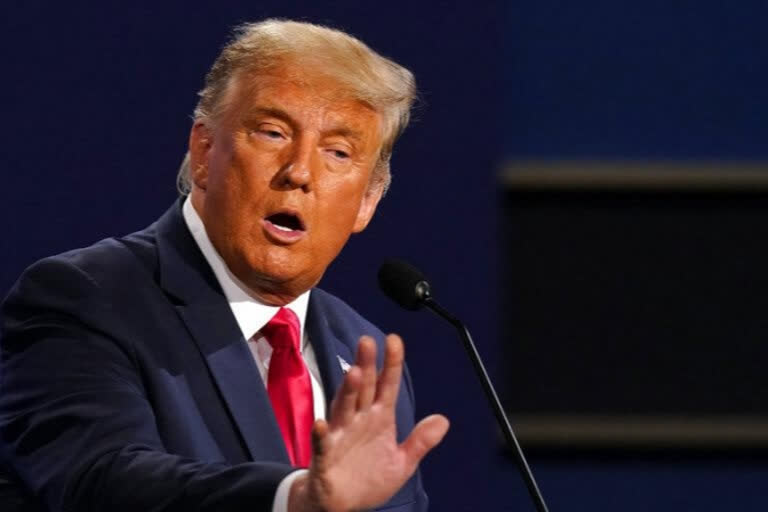Washington: The US Senate signalled on Tuesday that there are not nearly enough votes to convict ex-President Donald Trump in an impeachment trial when five Republican senators rejected an effort by Senator Rand Paul to declare the looming trial as unconstitutional.
The Hill reported that the upper chamber in the US Congress voted 55-45 to set aside Paul's motion but five GOP (another name for the Republican Party -- Grand Old Party) Senators Mitt Romney, Ben Sasse, Susan Collins, Lisa Murkowski (Alaska) and Pat Toomey (Pa.) voted with Democrats to " table Paul's point of order."
Senator John Thune said he thought the vote was "indicative" of where Republicans are but it doesn't "bind" them into voting a particular way on conviction.
Senator Rob Portman said he didn't think the vote was about whether or not the trial was constitutional but if there should be a discussion. The vote effectively pigeonholed Paul.
Portman added that he thought Tuesday's vote and the eventual question of acquittal or conviction are a "totally different issue."
Paul warned that he wanted to force his colleagues to go on the record.
Read:| YouTube extends suspension of Trump's channel indefinitely
"If we are going to put every politician in jail, are we going to impeach every politician who has used the words 'fight' figuratively in a speech? Shame," he said as quoted by The Hill, accusing Democrats of being "deranged by their hatred" of Trump.
"I want this body on record. Every last person here," Paul added.
Many Republican senators said heading into the vote that they hadn't made a decision on how they would vote, hadn't talked to Paul or, until they saw the Senate floor schedule, didn't know he would force the vote.
"Until I read my notice from the leader this morning I didn't know there was a chance it was going to happen," said Senator Roy Blunt.
While some Republican senators have said that they are waiting to hear the presentations during the trials, many Senators are latching on that the trial next month is not constitutional.
Senator Joni Ernst, in a statement quoted by The Hill, said that Trump "exhibited poor leadership and holds some responsibility" for the attack on the Capitol on January 6, that her "concern right now is that the President is no longer in office."
"Congress would be opening itself to a dangerous standard of using impeachment as a tool for political revenge against a private citizen, and the only remedy at this point is to strip the convicted of their ability to run for future office -- a move that would undoubtedly strip millions of voters of their ability to choose a candidate in the next election," she added.
Senate Minority Leader Mitch McConnell who previously said that Trump "provoked" and "fed lies" to his supporters before they stormed the Capitol, voted against tabling Paul's effort. McConnell has said he's undecided on whether he will vote to convict the former president.
Both Romney and Murkowski said on Tuesday before the vote that they believed the trial was constitutional. "My review of it has led me to conclude that it is constitutional in recognizing that impeachment is not solely about removing a president, it is also a matter of political consequence," Murkowski said, according to The Hill.
Romney added that "the preponderance of opinion with regards to the constitutionality of a trial of the impeachment of a former president is saying that it is a constitutional process."
Toomey indicated in a statement that his vote does not mean he will convict Trump at the end of the trial. "When President Trump's impeachment trial begins on February 9th, I will again fulfil my responsibility to consider the arguments made by his lawyers and the House managers," he said.
Collins said she had been speaking with constitutional scholars. "[I] concluded that the text of the constitution, the purpose of the provision, and Senate precedent all meant that the trial should go forward, especially since the House acted while the president was still in office," Collins said.
Democrats in the upper chamber argue that Republicans are trying to avoid having to decide on if Trump's rhetoric met the bar for conviction.
"Some of my Republican colleagues have latched onto a fringe legal theory that the Senate does not have the constitutional power to hold a trial because Donald Trump is no longer in office," said Senate Majority Leader Charles Schumer, as per The Hill.
"This argument has been roundly debunked by constitutional scholars from the left, right and centre. It defies precedent, historic practice, and basic common sense," he added.
Read:| Trump impeachment trial underway, arguments to begin on Feb 9
The US Senate formally opened the second impeachment trial for former President Donald Trump on Tuesday with the swearing-in of Senate President Pro-Tempore Patrick Leahy to preside over the process and the swearing-in of the senators to serve as jurors.
On Monday, the House of Representatives delivered the article of impeachment against Trump, accusing him of inciting an insurrection at the US Capitol building on January 6 to stop Congress from verifying President Joe Biden's win in the 2020 election.
The impeachment trial arguments will begin on February 9.
ANI



